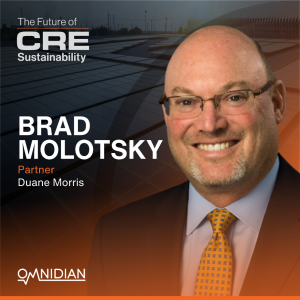
Thursday Apr 10, 2025
EP 13 — Duane Morris’ Brad Molotsky on Why Solar Survives While Wind Falls in New Energy Landscape
The post-election landscape is dramatically shifting the regulatory environment for sustainability in commercial real estate, with states stepping up to fill the federal void. In this episode of The Future of CRE Sustainability, Brad Molotsky, Partner at Duane Morris, provides a candid analysis of how commercial real estate sustainability is evolving as political winds shift, from building energy performance standards (BEPS) gaining momentum in 46+ cities to California's aggressive climate disclosure requirements affecting companies nationwide.
Brad explains to Sean how the industry has evolved from focusing on simple energy efficiency in 2005-2010 to embracing clean energy under the Biden administration's Inflation Reduction Act, and now facing a federal retrenchment that's paradoxically accelerating state-level climate initiatives. Brad also details how prominent companies are strategically pivoting their messaging away from "ESG" toward "efficiency" while maintaining the same sustainability goals, and offers critical insights on which renewable energy incentives will likely survive under the new administration.
Topics discussed:
- How sustainability messaging in CRE is returning to efficiency-focused language as ESG becomes politically contentious, enabling companies to achieve the same goals under less controversial framing.
- The rapid emergence of state-level building energy performance standards (BEPS) with 14 jurisdictions already implementing requirements and 46 more committing to pass regulations by 2025-2026.
- California's groundbreaking climate disclosure laws requiring companies with $500M+ revenue to report climate risks and those with $1B+ to disclose Scope 1-3 emissions, creating ripple effects across all supply chains regardless of location.
- How foreign investors from Europe, Canada, and the UK are driving sustainability requirements in US commercial real estate due to their more advanced regulatory environments and ESG expectations.
- The dramatic insurance premium increases (20-30% annually for multiple years) in climate-vulnerable regions forcing investment committees to incorporate climate risk into acquisition decisions.
- Strategic approaches to renewable energy tax credits under changing administrations, with solar likely to survive due to its employment numbers (450,000+ jobs) versus wind and EV incentives facing elimination.
- The unexpected investment opportunity in PFAS remediation technology as these "forever chemicals" become the subject of massive litigation against government agencies, property owners, and manufacturers.
No comments yet. Be the first to say something!